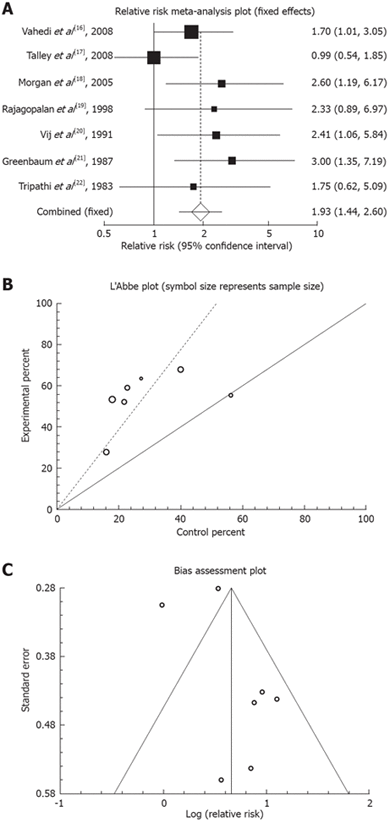Efficacy of tricyclic antidepressants in irritable bowel syndrome: a meta-analysis
- PMID: 19340896
- PMCID: PMC2669938
- DOI: 10.3748/wjg.15.1548
Efficacy of tricyclic antidepressants in irritable bowel syndrome: a meta-analysis
Abstract
We aimed to evaluate the efficacy of tricyclic antidepressants (TCAs) as a therapeutic option for irritable bowel syndrome (IBS) through meta-analysis of randomized controlled trials. For the years 1966 until September 2008, PubMed, Scopus, Web of Science, and Cochrane Central Register of Controlled Trials were searched for double-blind, placebo-controlled trials investigating the efficacy of TCAs in the management of IBS. Seven randomized, placebo-controlled clinical trials met our criteria and were included in the meta-analysis. TCAs used in the treatment arm of these trials included amitriptyline, imipramine, desipramine, doxepin and trimipramine. The pooled relative risk for clinical improvement with TCA therapy was 1.93 (95% CI: 1.44 to 2.6, P < 0.0001). Effect size of TCAs versus placebo for mean change in abdominal pain score among the two studies was -44.15 (95% CI: -53.27 to -35.04, P < 0.0001). It is concluded that low dose TCAs exhibit clinically and statistically significant control of IBS symptoms.
Figures



References
-
- Videlock EJ, Chang L. Irritable bowel syndrome: current approach to symptoms, evaluation, and treatment. Gastroenterol Clin North Am. 2007;36:665–685, x. - PubMed
-
- Evidence-based position statement on the management of irritable bowel syndrome in North America. Am J Gastroenterol. 2002;97:S1–S5. - PubMed
-
- Croghan A, Heitkemper MM. Recognizing and managing patients with irritable bowel syndrome. J Am Acad Nurse Pract. 2005;17:51–59. - PubMed
-
- Longstreth GF, Wilson A, Knight K, Wong J, Chiou CF, Barghout V, Frech F, Ofman JJ. Irritable bowel syndrome, health care use, and costs: a U.S. managed care perspective. Am J Gastroenterol. 2003;98:600–607. - PubMed
Publication types
MeSH terms
Substances
LinkOut - more resources
Full Text Sources
Miscellaneous

